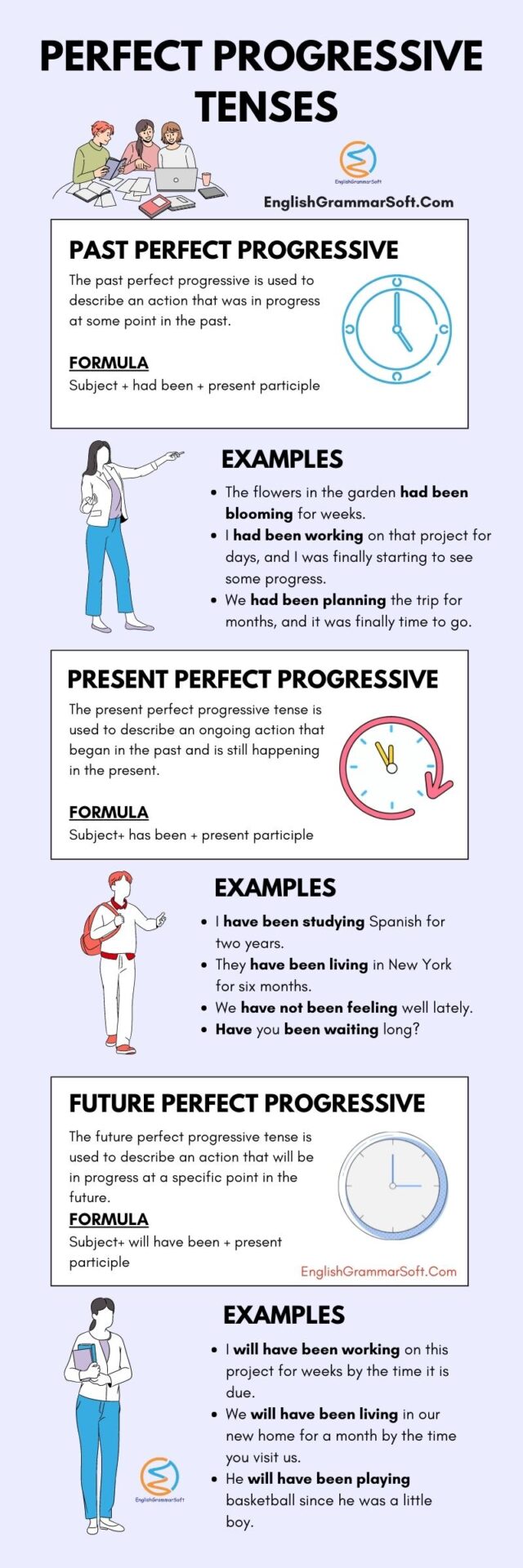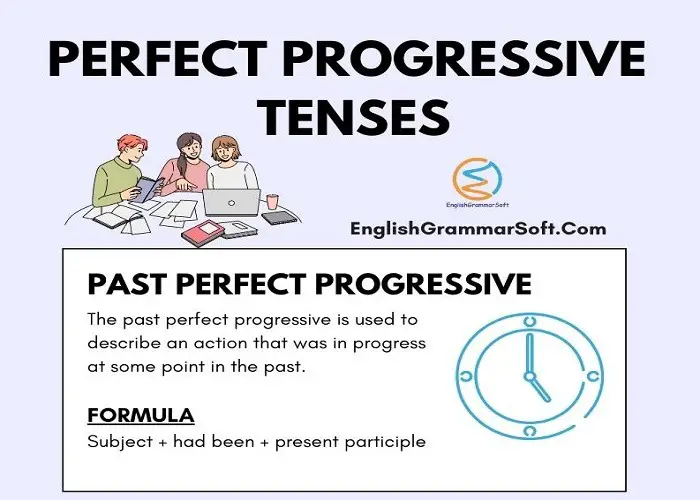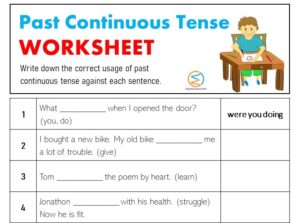What are 3 Perfect Progressive Tenses? (Examples & Structure)
The perfect progressive tense is used to describe an ongoing action that began in the past and will continue into the future. For example, “I have been studying French for two years.”
The perfect progressive can be used with all verbs except for stative verbs, which express states rather than actions. Stative verbs include verbs of being, possession, senses, and emotions.
Types and Uses of Perfect Progressive Tenses
The perfect progressive can be used to talk about past, present, or future actions.
The three perfect progressive tenses are the past perfect progressive, present perfect progressive, future perfect progressive. Each tense has a different use.
The past perfect progressive tense is used to describe an action that was happening up until a specific point in the past. For example, “I had been studying French for one year before I moved to France.”
The present perfect progressive tense is used to describe an ongoing action that began at some point in the past and is still happening in the present. For example, “I have been studying French for two years.”
The future perfect progressive tense is used to describe an action that will happen up until a specific point in the future. For example, “I will have been studying French for three years by the time I graduate.”
We’ll discuss these tenses one by one.
Past Perfect Progressive
The past perfect progressive is used to describe an action that was in progress at some point in the past. It is formed by using the past perfect tense of the verb “to be” (had been) plus the present participle of the main verb (i.e., the base form of the verb plus -ing). For example:
- They had been living in New York for a year before they decided to move to Los Angeles.
- I had been taking my car to the same mechanic for years before I finally found someone I could trust.
- She had been going to the same hairdresser since she was a little girl, but she decided to try a new one last week.
Past Perfect Progressive Tense Structure
The structure of past perfect progressive tense is:
Affirmative
Subject + had been + present participle
| Subject | auxiliary verb | main verb | time reference |
| I | had been | studying | French for six months before I moved to France. |
Negative
To make a negative sentences, add “not” after “had”.
Subject + had + not + been + present participle
For example, I have not been studying French for six months.
Interrogative
To make the interrogative sentence, “had” comes at the start and question mark at the end.
Had + subject + been + present participle + ?
For example, Have I been studying French for six months?
Examples of Past Perfect Progressive Tense
- She hadn’t been eating for days and was very weak.
- We had been driving for hours when we finally stopped for a break.
- They had been playing tennis for an hour before they noticed the rain.
- I hadn’t been feeling well all day, but I didn’t want to miss the party.
- Mary had been working on her project for weeks before she realized she was going in the wrong direction.
- John had been jogging for months before he won his first race.
- George had been taking guitar lessons for years before he gave his first concert.
- They had been waiting in line for over an hour when they got to the restaurant.
- She had been training for the marathon for months before running the race.
- We had been planning the party for days before we finally hosted it.
- I had been caring for my little sister while my mom was at work.
- She had been cooking dinner when she suddenly realized she had no salt.
- They had been playing video games for hours when they finally decided to take a break.
- We had been studying for the test all week but still failed.
- I had been hoping to get a raise, but my boss said no.
- She had been trying to lose weight for years but never succeeded.
- They hadn’t been getting along for months before they finally decided to divorce.
- We had been planning the party for many weeks before it was finally time to celebrate.
- He hadn’t been eating much lately, so I worried about his health.
- She’d been trying different outfits for hours before finding the perfect dress for her date.
- I’d been working on my car for three days, but it still wasn’t running properly.
- They’d been painting the house all morning and were exhausted by the afternoon.
- We’d been waiting in line for over an hour and were getting impatient.
- He’d been studying for the test all week, but he still didn’t feel confident about his chances of passing.
- She’d been practicing her speech for weeks, but she still got nervous when she had to give it in front of a large audience.
- I hadn’t been feeling well for days before I went to the doctor.
- Had you been waiting long before I arrived?
- She had been jogging for a while before she got tired.
- They had been working on the project for months before finishing it.
- We had been planning the trip for weeks before we finally left on our vacation.
- The company had been looking for a new CEO for months before finding the right person for the job.
- He had been training for the marathon for months before running it.
- She had been working on her novel for years before publishing it last month.
- He had been training for the marathon for months before he ran it last weekend.
- We had been living in our new house for a few months before unpacking all the boxes.
- I had been studying the language for years before I ever traveled to a Spanish-speaking country.
- The flowers in the garden had been blooming for weeks.
- I had been working on that project for days, and I was finally starting to see some progress.
- He said he’d been waiting for this moment his whole life.
- It seemed like they had been arguing forever.
Present Perfect Progressive
The present perfect progressive tense is used to describe an ongoing action that began in the past and is still happening in the present. To form this tense, you will use the present perfect tense of the verb “to be” (have/has been) plus the present participle of the main verb (the verb describing the action). For example:
- I have been studying Spanish for two years.
- They have been living in New York for six months.
- We have not been feeling well lately.
- Have you been waiting long?
Present Perfect Progressive Tense Structure
The structure of present perfect progressive tense is:
Affirmative
Subject + has/have been + present participle
| Subject | auxiliary verb | main verb | time reference |
| I | have been | studying | French for six months. |
Negative
To make a negative sentences, add “not” after “has or have”.
Subject + has/have + not + been + present participle
For example, I have not been studying French for six months.
Interrogative
To make the sentence interrogative, “has or have” comes at the start and question mark at the end.
Has/have + subject + been + present participle + ?
For example, Have I been studying French for six months?
Examples of Present Perfect Progressive Tense
- I have been studying English for two years.
- She has been working at that company for three months.
- We have been living in this city for four years.
- They have been playing tennis for an hour.
- I have been waiting for you for two hours!
- Have you been watching TV all night?
- He has been writing a novel for five years but hasn’t finished it yet.
- I have been taking a shower for fifteen minutes.
- He has been cooking dinner for twenty minutes.
- She has been doing the laundry for thirty minutes.
- Have you been exercising regularly these days?
- How long have you been meeting him?
- She has been having trouble sleeping lately.
- We have been hoping to go on vacation soon.
- They have been planning their wedding for a while now.
- I have been trying to learn how to play the piano for years.
- They have been renovating their house for months, and it’s still not finished.
- I have been feeling a bit under the weather lately.
- Have you been working out? You look great!
- It has been snowing non-stop for the past three days.
- We have been hoping to move to a new house soon.
- He has been taking care of his sick grandmother since last week.
- Have you been eating healthy?
- How long have you been playing the piano?
- I have been feeling sick since this morning.
- He has been playing the piano since he was a child.
- I have been taking these vitamins for a week and feel great!
Future Perfect Progressive
The future perfect progressive tense is used to describe an action that will be in progress at a specific point in the future. This tense is formed by using the construction “will + have been + verb-ing.” For example:
- I will have been working on this project for two hours by the time you get here.
- She will have been studying for her test all day before she takes it tonight.
- They will have been driving for six hours when they reach their destination.
Where to use future perfect progressive?
The future perfect progressive tense can be used in both spoken and written English. It is most often used in formal contexts, such as academic writing or business communications. However, it can also be used in casual conversation when you want to emphasize that an action will definitely be happening at a specific point in the future.
Future Perfect Progressive Tense Structure
The structure of future perfect progressive tense is:
Affirmative
Subject + will have been + present participle
| Subject | auxiliary verb | main verb | time reference |
| I | will have been | studying | French for six months by the time I go to Paris. |
Negative
To make a negative sentences, add “not” after “will”.
Subject + will + not + have been + present participle
For example, I will not have been studying French for six months by the time I go to Paris.
Interrogative
To make the sentence interrogative, “will” comes at the start and question mark at the end.
Will + subject + have been + present participle + ?
For example, Will I have been studying French for six months by the time I go to Paris?
Examples of Future Perfect Progressive Tense
- We will have been studying the language for two years by the time we graduate.
- I will have been driving for eight hours by six pm tonight.
- I will have been working on this project for weeks by its due date.
- We will have been living in our new home for a month by the time you visit us.
- I will have been practicing the piano for six hours by the time I go to bed tonight.
- By next year, we will have been planning our wedding for nine months!
- They will have been working on the project for two weeks by the time we meet again.
- I will have been living in New York for a year by next summer.
- He will have been playing tennis for two hours by the time you get home.
- We will have been waiting for you for half an hour by the time you arrive.
- They will have been watching TV for three hours by the time we leave.
- She will have been cooking dinner for an hour by the time you call.
- They will have been living in Glasgow for two months when their baby is born.
- When she arrives, they will have been waiting for two hours.
- I will have been working at my new job for a week by the time you visit me.
- She won’t have been feeling well for very long before she sees the doctor.
- He will have been writing his novel for two years by the time it is published.
- The flowers will have been blooming for a few days by the time we get there.
- By next week, she will have been teaching at the high school for twenty years.
- He will have been playing the piano for five years by the time he turns eighteen.
- By the time she graduates, she will have been taking classes at the college for four years.
- He will have been training for the marathon for six months by the time he runs it.
- I will have been taking driving lessons for three months by my birthday.
- By the end of this month, she will have been working out at the gym for six months straight.
- He will have been playing tennis for two hours by the time his match ends.
- They will have been painting the house for four days by the time they finish it.
- He will have been playing the violin for ten years by the time he turns eighteen.
- We will have been planning our trip to Europe for six months by the time we leave.
- You will have been learning about gerunds and infinitives for a while before you feel comfortable using them yourself.
- He will have been playing soccer since he was a child by the time he joined the school team in high school.
- They will have been planning their wedding for a year by the time they finally get married.

Further Reading







